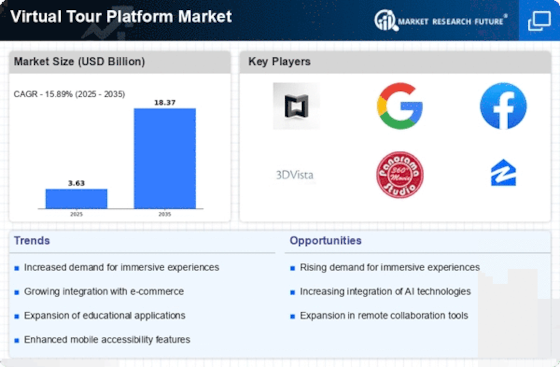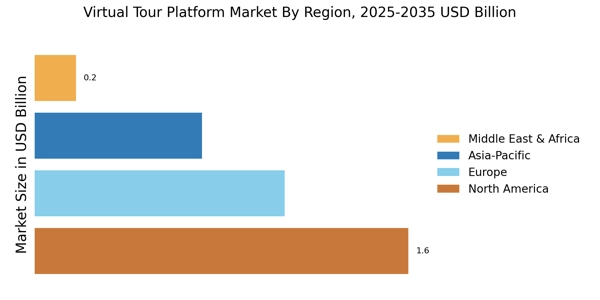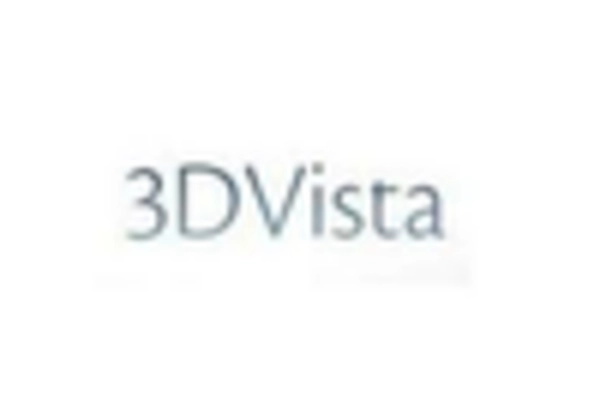Rising Demand for Immersive Experiences
The Virtual Tour Platform Market is witnessing a notable increase in demand for immersive experiences across various sectors. As consumers seek more engaging and interactive content, businesses are leveraging virtual tours to enhance customer engagement. This trend is particularly evident in real estate, where virtual tours allow potential buyers to explore properties remotely. According to recent data, the real estate sector has seen a 30% increase in the use of virtual tours, indicating a shift towards digital solutions. Additionally, the tourism industry is adopting virtual tours to provide potential travelers with a taste of destinations, thereby influencing their travel decisions. This growing demand for immersive experiences is likely to drive the expansion of the Virtual Tour Platform Market, as companies strive to meet consumer expectations.
Expansion of E-commerce and Online Retail
The Virtual Tour Platform Market is significantly influenced by the expansion of e-commerce and online retail. As more consumers turn to online shopping, retailers are seeking innovative ways to showcase their products. Virtual tours provide an effective solution, allowing customers to explore products in a 3D environment, which enhances the shopping experience. Recent statistics indicate that e-commerce sales have surged, with a projected growth rate of 15% annually. This trend is prompting retailers to invest in virtual tour technologies to differentiate themselves in a competitive market. By integrating virtual tours into their online platforms, businesses can potentially increase conversion rates and customer satisfaction, thereby contributing to the growth of the Virtual Tour Platform Market.
Growing Interest in Remote Work Solutions
The Virtual Tour Platform Market is experiencing growth due to the increasing interest in remote work solutions. As organizations adapt to flexible work arrangements, there is a rising need for virtual collaboration tools that facilitate remote interactions. Virtual tours are being utilized for virtual office tours, allowing potential employees to experience the workplace environment from anywhere. This trend is particularly relevant in the recruitment process, where companies aim to attract talent by showcasing their work culture. The demand for such solutions is expected to rise, as businesses continue to embrace remote work practices. Consequently, this shift is likely to bolster the Virtual Tour Platform Market, as companies seek to implement effective virtual solutions.
Enhanced Marketing Strategies for Businesses
The Virtual Tour Platform Market is increasingly shaped by enhanced marketing strategies adopted by businesses. Companies are recognizing the potential of virtual tours as a powerful marketing tool that can elevate brand visibility and customer engagement. By providing immersive experiences, businesses can effectively communicate their value propositions to consumers. Recent trends indicate that businesses utilizing virtual tours have reported a 25% increase in customer engagement metrics. This shift towards innovative marketing approaches is driving the demand for virtual tour platforms, as organizations seek to differentiate themselves in a crowded marketplace. As a result, the Virtual Tour Platform Market is likely to see continued growth, fueled by the need for effective marketing solutions.
Increased Investment in Real Estate Technology
The Virtual Tour Platform Market is benefiting from increased investment in real estate technology. As the real estate sector evolves, stakeholders are recognizing the value of technology in enhancing property marketing and sales processes. Virtual tours have emerged as a key tool for real estate agents and developers, enabling them to present properties in a more compelling manner. Recent data suggests that investment in real estate technology has grown by over 20% in the past year, with virtual tour platforms being a focal point of this investment. This trend indicates a shift towards more innovative marketing strategies, which are likely to drive the demand for virtual tour solutions within the Virtual Tour Platform Market.

















